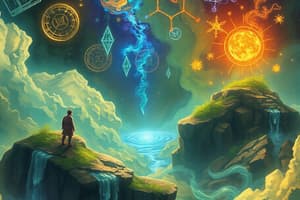Podcast
Questions and Answers
What is the first step in the scientific method?
What is the first step in the scientific method?
- Making an observation or asking a question (correct)
- Formulating a hypothesis
- Analyzing the results
- Testing the hypothesis through an experiment
Which civilizations are credited with laying the foundations of modern science?
Which civilizations are credited with laying the foundations of modern science?
- Ancient Romans
- Greeks (correct)
- Mayans
- Egyptians
What is the focus of physics as a natural science?
What is the focus of physics as a natural science?
- Study of living organisms
- Study of historical events
- Study of matter, energy, and their interactions (correct)
- Study of human behavior
Which step in the scientific method involves conducting experiments?
Which step in the scientific method involves conducting experiments?
Who is known for proposing the theory of evolution through natural selection?
Who is known for proposing the theory of evolution through natural selection?
What discipline is focused on studying the chemical properties of matter in the natural sciences?
What discipline is focused on studying the chemical properties of matter in the natural sciences?
What is the focus of the social sciences?
What is the focus of the social sciences?
Which field studies the production, distribution, and consumption of goods and services?
Which field studies the production, distribution, and consumption of goods and services?
What does anthropology primarily study?
What does anthropology primarily study?
Which scientific field mainly studies Earth's history and processes?
Which scientific field mainly studies Earth's history and processes?
What is one criticism sometimes directed towards science?
What is one criticism sometimes directed towards science?
What makes the scientific method a powerful tool for understanding the world?
What makes the scientific method a powerful tool for understanding the world?
Study Notes
Exploring the Wonders of Science
Science is a dynamic, interconnected field that seeks to understand the world around us through observation, experimentation, and reasoning. It encompasses a wide range of disciplines, from physics and chemistry to biology and psychology, all working together to reveal the complexities of the universe, life, and our own minds.
The Scientific Method
The scientific method is a fundamental process that underlies all scientific investigation. It involves:
- Making an observation or asking a question.
- Formulating a hypothesis.
- Testing the hypothesis through an experiment.
- Analyzing the results.
- Drawing a conclusion.
- Communicating the findings.
This iterative process allows us to refine our understanding of the world and to continually ask better questions.
The History of Science
The roots of modern science can be traced back to ancient civilizations, such as the Greeks, who first began to develop the principles of mathematics, physics, and astronomy. The Renaissance and the Age of Enlightenment saw major scientific advancements, with thinkers like Galileo Galilei, Sir Isaac Newton, and Charles Darwin making seminal contributions to our understanding of the world.
The Natural Sciences
The natural sciences, also known as the physical sciences, study natural phenomena and the physical and chemical properties of matter. These disciplines include:
- Physics: The study of matter, energy, and their interactions.
- Astronomy: The study of celestial bodies and the physical processes that govern them.
- Chemistry: The study of matter, its composition, properties, and behavior.
- Geology: The study of Earth's history, composition, and processes.
- Biology: The study of life and living organisms.
These fields have provided us with a deep understanding of the fundamental interactions that shape our universe and the living world.
The Social Sciences
The social sciences, on the other hand, focus on the study of human behavior and society. These disciplines include:
- Anthropology: The study of human cultures, societies, languages, and biology.
- Economics: The study of the production, distribution, and consumption of goods and services.
- Psychology: The study of the human mind and behavior.
- Political science: The study of government and political systems.
- Sociology: The study of human society and social interactions.
Social sciences offer valuable insights into human behavior and collective actions, providing a deeper understanding of our societies and cultures.
The Impact of Science
Science has had a profound and lasting impact on our world, driving technological advancements and improving our quality of life. From medical breakthroughs that have extended human lifespans and combat deadly diseases to the development of renewable energy sources and more efficient transportation systems, science has provided solutions to some of the most pressing challenges facing humanity.
The Continuing Debate
Science is not infallible, and not all scientific discoveries are universally accepted. Some people argue that science may be overly focused on materialistic explanations and ignore other aspects of reality, such as spirituality or subjective experiences.
Despite these debates, the scientific method remains the most powerful tool we have for understanding the world around us. Through evidence-based investigations and a commitment to truth, science continues to uncover new insights and solve some of the most complex problems facing our society.
Science is a vast and dynamic field, with new discoveries and insights being made every day. By engaging with the wonders of science, we can expand our understanding of the world and push the boundaries of what is possible. So the next time you look up at the stars, wonder at the intricacies of the natural world, or marvel at a new technological innovation, remember the countless scientists who have contributed to our understanding and continue to shape our future.
Science is a journey of discovery that we all have the opportunity to embark upon, and it is one that is truly worth exploring.
[Reference(s): Not provided, but the content is a synthesis of widely known facts and concepts.]
Studying That Suits You
Use AI to generate personalized quizzes and flashcards to suit your learning preferences.
Description
Delve into the wonders of science, from the scientific method to the impactful discoveries that have shaped our world. Explore disciplines like physics, biology, social sciences, and the profound impact of science on society. Embrace the journey of discovery through the lens of scientific inquiry and exploration.




